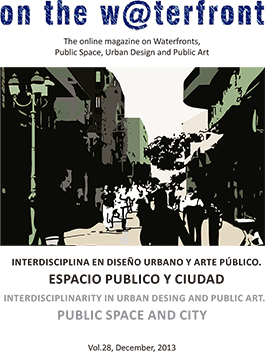ART PÚBLIC I INTERDISCIPLINA. PROBLEMÀTIQUES DE LA FORMACIÓ ARTÍSTICA DISCIPLINAR
Paraules clau:
Art, art públic, ensenyament artístic, interdisciplinarietat, dissenyResum
El reconeixement de les característiques i diferències entre art, art en l'espai públic i art públic han d’aclarir quines són les competències que ha de tenir un artista públic. L’artista tradicional, acostumava a actuar dins l'àmbit de l’art introspectiu en referència a un mateix, no necessàriament habilitats o eines metodològiques per actuar en un entorn complex i dinàmic com l'espai públic, el qual exigeix que l'altre - el públic – es situí en el centre dels objectius d'aquests projectes. La complexitat de l'espai públic no pot ésser cobert per una sola disciplina, així que en els processos de projectació urbanística, l'art públic esdevé treball interdisciplinari; necessari per assolir una visió àmplia i sintètica integrant diversos problemes, per donar respostes a la complexitat que inclouen les necessitats i expectatives de la comunitat. Com ha de ser doncs la formació d’un artista públic? S’ha de partir de la formació disciplinar integrant-la amb disciplines com el disseny – les quals tenen una marcada vocació envers altri- o s’ha de crear una formació específica que doti a l’artista tant de les habilitats comunicatives i expressives a través de l’experiència estètica -pròpies del llenguatge artístic com de la vocació de satisfer les necessitats de la col·lectivitat – pròpies del disseny i la capacitat de treballar interdisciplinarment?
Arribem a la conclusió que es important la formació artística disciplinar com a bagatge de coneixement especialitzat a compartir en el treball interdisciplinari, però acompanyat d’una educació actitudinal que alliberi a l’artista pºublic de les dificultats pròpies de l’aspecte introspectiu de la seva formació artística. En especial formar l’artista amb metodologies i dinàmiques de treball necessàries per desenvolupar-se positiva i productivament en contextos de treball interdisciplinari.
Publicades
Com citar
Número
Secció
Llicència
 La llicència us permet: Compartir - copiar i redistribuir el material en qualsevol mitjà o format i Adaptar - remesclar, transformar i construir sobre el material per a qualsevol propòsit, fins i tot comercialment. El llicenciador no pot revocar aquestes llibertats mentre l'usuari compleixi els termes de la llicència. Els drets d'autor estan protegits per ISSN 1139-7365. A la revista w@terfront no hi ha restriccions de drets d'autor i permet als autors conservar els drets de publicació sense restriccions.
La llicència us permet: Compartir - copiar i redistribuir el material en qualsevol mitjà o format i Adaptar - remesclar, transformar i construir sobre el material per a qualsevol propòsit, fins i tot comercialment. El llicenciador no pot revocar aquestes llibertats mentre l'usuari compleixi els termes de la llicència. Els drets d'autor estan protegits per ISSN 1139-7365. A la revista w@terfront no hi ha restriccions de drets d'autor i permet als autors conservar els drets de publicació sense restriccions.Aquesta revista no cobra als autors cap taxa per enviar o processar articles.







